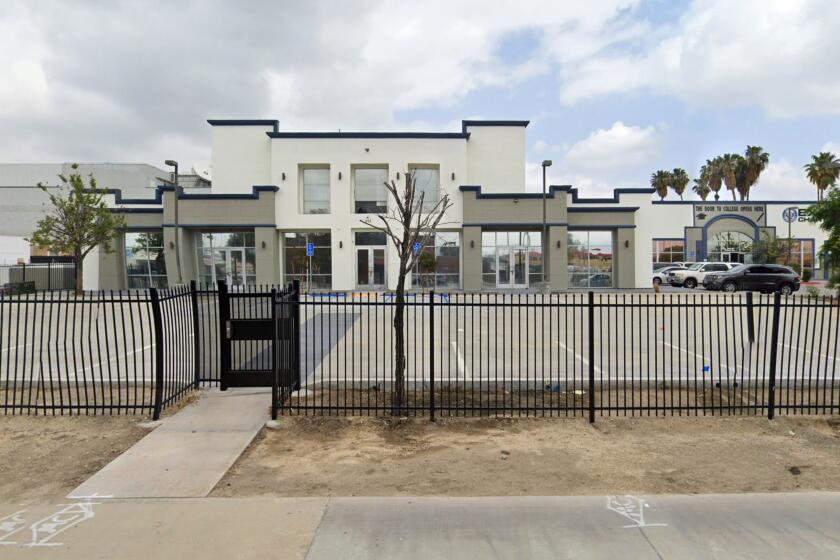OT pushes guards’ pay past $100,000
Overcrowding and other strains on California’s prisons have sent overtime costs soaring for guards, boosting 6,000 officers’ salaries to upward of $100,000 a year, with hundreds of them earning more than lawmakers and other state officials.
Overtime costs rose 24% in the third quarter of this year over the same period last year, after having leaped 87% -- to $375 million, according to the most recent figures -- since the officers’ current labor contract took effect five years ago. At that time, about 500 members of the California Correctional Peace Officers Assn. made six figures.
Most of the high earners are rank-and-file correctional officers, payroll records show. Others include sergeants, lieutenants, medical assistants and parole agents working for the California Department of Corrections and Rehabilitation.
The biggest payout, $252,570 in the fiscal year that ended in June, went to a lieutenant. That is twice what wardens earn and twice what was then the correction chief’s salary, since increased to $225,000 a year. It is also more than Gov. Arnold Schwarzenegger’s salary as California’s highest official; the governor declines the pay, which is set at $206,500 for 2007.
“This business of overtime is just out of control,” said Lew Uhler, president of the National Tax Limitation Committee, a Sacramento-based antitax group. “If you had a comparable situation in the private sector, the management would have been fired long ago.
“The average family with two adults working, trying to make do with $50,000 between them, should be outraged about this.”
The governor’s office declined to comment, referring questions to corrections officials, who acknowledged that overtime is a continuing problem they’re trying to address.
On Thursday, Schwarzenegger, who last fall declared a state of emergency in the state’s prisons, renewed a vow to fix the broken corrections system.
He announced a plan to ease crowding with such measures as building prisons, rehabilitating prisoners to reduce the number who commit crimes again and return to custody, and creating a panel to review sentencing laws that send many nonviolent offenders to state lockups.
This month, a federal judge in Sacramento ordered the governor to take steps to ease crowding by June.
California has the nation’s largest prison system, incarcerating almost 174,000 people in 33 prisons that were designed for 100,000.
While relatively few officers are required to guard inmates housed in cells, far more are needed to watch those housed in gymnasiums and other areas not meant for sleeping, said Scott Kernan, acting director of adult prisons.
“Population is the biggest driving force” in the soaring overtime, Kernan said.
Chuck Alexander, executive vice president of the California Correctional Peace Officers Assn., said the overtime is necessary because there aren’t enough officers. They are often ordered to work extra shifts in emergencies and when other officers call in sick or are otherwise unable to work.
“I can’t have a control booth vacant,” Alexander said. “We have to fill our positions.”
The Bureau of State Audits has examined overtime costs in the prison system at least three times since 2000. The last review was January 2005, when auditors reported that “excessive and expensive use of overtime” was a persistent problem.
Data from the state controller’s office shows that in fiscal 2005-06:
* Base pay for the 6,000 prison workers who earned $100,000 or more amounted to $453 million. Overtime, paid at time-and-a-half, added $220 million to those wages.
* Scores of workers made more in overtime than in regular pay. Fourteen employees earned $100,000 or more in overtime alone, and 919 workers earned $50,000 or more in overtime.
* More than 1,600 officers’ earnings exceeded legislators’ 2007 salaries of $113,098.
Dan Macallair, executive director of the nonprofit Center on Juvenile and Criminal Justice and a critic of the state corrections system, contends that tough sentences imposed on nonviolent offenders have inflated the inmate population. And he noted that the correctional officers union has pushed for many of the laws that have led to crowding.
“As long as overcrowding exists, overtime becomes a very lucrative source of income,” Macallair said.
Alexander said the state could reduce overtime by hiring as many as 4,000 people to fill vacancies.
He blamed the guard shortage on a decision to shut the academy for new recruits for eight months in 2004.
At that time, the prison population had dipped, and some officials believed the decline would continue.
The drop turned out to be temporary.
Attorney Don Specter, director of the Prison Law Office, which is suing the state over prison crowding, agreed that the decision to shut the academy was a “mistake.”
“They don’t have enough officers to safely man the prisons,” Specter said.
The corrections department has increased its recruitment, hoping to attract new officers by airing radio spots and running newspaper and website ads touting pay and retirement benefits. The department has reopened its main academy south of Sacramento and is conducting training courses at three community colleges.
Meanwhile, the five-year contract that former Gov. Gray Davis signed with the union in 2002 has pushed time-and-a-half ever higher with a series of pay raises that probably will exceed 30% by the time the pact expires in June.
That contract and an earlier one also included provisions making it easier for officers to claim overtime.
Times staff writers Evan Halper and Nancy Vogel contributed to this report.
More to Read
Start your day right
Sign up for Essential California for news, features and recommendations from the L.A. Times and beyond in your inbox six days a week.
You may occasionally receive promotional content from the Los Angeles Times.






